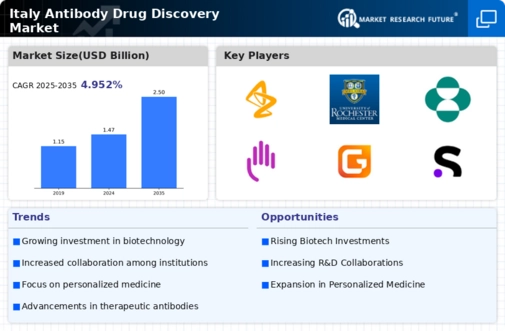Supportive Regulatory Framework
Italy's regulatory framework appears to be increasingly supportive of innovation within the antibody drug-discovery market. The Italian Medicines Agency (AIFA) has been actively working to streamline approval processes for new therapies, which may encourage pharmaceutical companies to invest in research and development. In recent years, the approval timelines for innovative drugs have shortened, potentially leading to faster market entry for new antibody-based therapies. This regulatory environment is crucial, as it fosters a climate of innovation and encourages collaboration between academia and industry. As a result, the antibody drug-discovery market is likely to benefit from a more efficient pathway to commercialization, which could enhance the overall growth of the sector in Italy.
Growing Demand for Targeted Therapies
The rising prevalence of chronic diseases in Italy is driving the demand for targeted therapies, which are often developed through the antibody drug-discovery market. As healthcare providers seek more effective treatment options, the focus on precision medicine is intensifying. In 2025, the Italian pharmaceutical market is projected to reach approximately €35 billion, with a significant portion allocated to innovative therapies. This trend suggests that investments in antibody drug-discovery are likely to increase, as companies aim to develop therapies that specifically target disease mechanisms. Furthermore, the Italian government has been promoting initiatives to enhance research capabilities, which may further bolster the antibody drug-discovery market. The convergence of these factors indicates a robust growth trajectory for targeted therapies. This positions the antibody drug-discovery market as a critical component of Italy's healthcare landscape..
Advancements in Biotechnological Techniques
Recent advancements in biotechnological techniques are reshaping the landscape of the antibody drug-discovery market in Italy. Innovations such as CRISPR gene editing and high-throughput screening are enabling researchers to identify and develop novel antibodies with greater efficiency. These technologies not only streamline the discovery process but also enhance the specificity and efficacy of therapeutic antibodies. In 2025, the Italian biotechnology sector is expected to contribute around €10 billion to the economy, reflecting the increasing integration of technology in drug development. This growth is likely to attract further investments into the antibody drug-discovery market, as companies seek to leverage cutting-edge techniques to stay competitive. The synergy between biotechnology and antibody development may lead to breakthroughs in treatment options, thereby expanding the market's potential.
Rising Investment in Healthcare Infrastructure
The Italian government is prioritizing investments in healthcare infrastructure. This is likely to have a positive impact on the antibody drug-discovery market.. Enhanced facilities and resources for research and development are essential for fostering innovation in drug discovery. In 2025, public and private investments in healthcare are projected to exceed €20 billion, with a significant portion directed towards biotechnology and pharmaceutical research. This influx of funding may lead to improved laboratory capabilities and increased access to advanced technologies, thereby facilitating the discovery of new antibodies. As the healthcare landscape evolves, the antibody drug-discovery market is expected to thrive, supported by a robust infrastructure that encourages scientific exploration and development.
Increased Collaboration Between Academia and Industry
Collaboration between academic institutions and industry players in Italy is becoming a pivotal driver for the antibody drug-discovery market.. Universities and research centers are increasingly partnering with pharmaceutical companies to translate scientific discoveries into viable therapeutic solutions. This synergy not only accelerates the research process but also enhances the quality of antibody development. In 2025, it is estimated that collaborative research initiatives could account for up to 30% of the total funding in the antibody drug-discovery market. Such partnerships are likely to facilitate knowledge exchange and resource sharing, ultimately leading to more innovative therapies. The growing trend of collaboration indicates a promising future for the antibody drug-discovery market, as it harnesses the strengths of both academia and industry.
























Leave a Comment